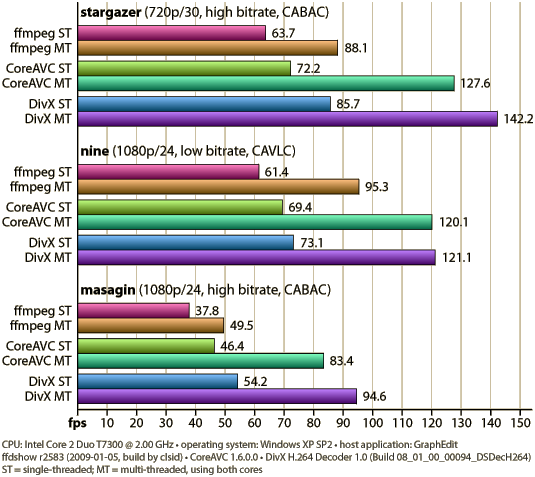(February 25, 2010)
There has been some buzz about HTML5 web video lately. I won’t retell the story here, because it’s almost completely political and not technical, while I’m only interested in the technical side of things. One thing that struck me, though, is that many people believe that the two contenders, H.264 and Ogg Theora, are comparative in quality and performance. As someone who implements video codecs for a living, this struck me as quite odd: How can a refined version of an old and crippled MPEG-4 derivate come anywhere close to a format that incorporates (almost) all of the the latest and greatest of video compression research? I decided to give it a try and compare H.264, Theora and a few other codecs myself.
Read more …
Posted in Computer Fun, Hacks, Reviews | 66 Comments ...
(February 26, 2009)
After the H.264 decoder benchmark I did when DivX 7 came out, I got some comments that I misrepresented CoreAVC by using an outdated version. Recently, I repeated the benchmarks using the newest version of CoreAVC fresh from their website. I also used more computers to test the decoders on, and the results were very interesting.
Read more …
Posted in Computer Fun, Reviews | 5 Comments ...
(February 6, 2009)
I usually write my demos using Microsofts C Compiler for Win32 and GCC for Linux. But how good does Intel’s compiler optimize? And can the performance of MSVC and GCC be improved using a clever selection of compiler switches? That’s what I wanted to find out, and so I wrote my own little benchmark based on some code of my demos and let it run through all these compilers with different options. The results are a little bit different from what I expected …
Read more …
Posted in Computer Fun, Reviews | No Comments yet
(January 6, 2009)
Today, DivX Inc. released the new version of its famous video codec. Usually, this is utterly uninteresting news, but not this time: Version 7 is actually not an MPEG-4 ASP codec like its predecessors, but a H.264 one, based on the implementation of MainConcept. This makes the codec a lot more interesting, especially since the decoder part is free (as in beer).
The H.264 software decoder situation on Windows was a bit complicated: There just was no perfect decoder. The InterVideo and CyberLink come only with their respective Blu-ray player applications, the one in QuickTime is complete crap, the Nero one doesn’t want to work in applications other than Nero’s own. So we only had ffdshow, which is open source, cool, but a little bit slow, and CoreAVC, which is blazing fast, but you need to pay for it.
As of today, this problem has been resolved once and for all: DivX 7 is the ultimate H.264 software decoder on Windows, period. I ran a little benchmark today and the results are very impressive: DivX 7 is always faster than CoreAVC, usually about 10% for CABAC sequences. ffdshow, on the other hand, is always slowest and makes the least use of multi-core CPUs.

Read more …
Posted in Computer Fun, Reviews | 7 Comments ...

 Post Feed
Post Feed